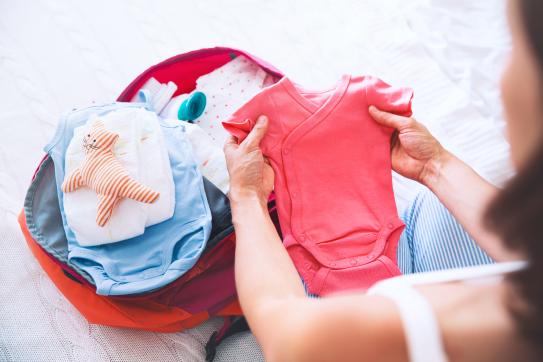When Carolyn Butler ’18 looked around the home where she was raising her 6-month-old daughter, she found herself awash in a sea of stuff: plastic toys, swaddling blankets, and a mounting pile of clothes her daughter was outgrowing by the week.
Looking into recycling and resale platforms for gently used baby goods, Butler found no solutions with a truly circular business model. In response, she and her husband launched Borobabi.com in 2020. Just two years later, now rebranded as Manymoons, the company spans six retail stores — Nantucket, San Francisco, two stores in Manhattan, and two New Jersey locations — and a booming online business across the United States. Butler shares what it’s been like to launch a business (during a pandemic with a baby at home, no less) as well as the role CBS played in her entrepreneurial journey.
Q: You describe Manymoons as “America’s first circular retailer.” Can you elaborate?
Carolyn Butler: We only source ethical and sustainable products made from natural, regenerative fiber. We sell things, but we also incentivize people to give stuff back to us, for a 20 percent credit, and then we rent it again online. So we actually utilize one item across four or five families. When we get it back, we take the responsibility to recycle and compost all of our post-consumer waste. Right now, we’re the only apparel company in the US operating in a truly circular way.
Q: Can you explain a little about the technology that underpins your business model?
Butler: We track historical ownership of every single product. It’s the same technology as blockchain, essentially, where you can see ownership history. This is a major opportunity in resale. It's actually connecting people to products in a meaningful way, which is something you need in order to get people invested in a circular model.
Q: Before you started your clothing company, you were a chemical engineer. That’s an unusual career pivot.
Butler: I actually worked as a chemical engineer for some very unsustainable companies: oil, petrochemical, and pesticide companies. I've seen the worst of it.
I saw that those companies were never going to change. But I also saw a huge opportunity as an entrepreneur. To disrupt these large, linear, archaic business models, you can only do it as a new company, because you can start with a new foundation. So I quit my job in 2019 to look into it.
Q: That was an interesting time for launching a business.
Butler: We launched in the middle of the pandemic — June of 2020. It was a weird time. We focused only online in the beginning, for obvious reasons. But when we could get in front of people, that made a huge difference. We have such a strong mission and purpose. By communicating directly with customers, we were able to get direct feedback.
We grew both online and in stores, and we raised money through family and friends and through Columbia’s network. And now we're venture backed.
Q: You hear from a lot of female founders that it can be tough to get VC funding. Why do you think that is?
Butler: Women are amazing leaders. We have emotional intelligence, and we're able to manage multiple things at once. But we tend to be realistic about what we can accomplish, and that's not what VCs want to hear. They want to be sold the craziest story, the biggest opportunity. A lot of women won't do that.
There are very few women in venture. It's hard when you're a woman founder, creating a product for a woman, and trying to raise money by pitching your business to men.
Q: How has your MBA helped you in this journey?
Butler: Prior to my MBA, I had an engineering degree, so I understood things like business unit economics, but I didn't really speak the language of business. The MBA education opened my eyes.
In the early days of this company, not only did I have access to amazing talent, I also raised money through Columbia. Through just our fellow graduates, we raised $300,000. I also raised funds through the Columbia Angel Network. I joined the Startup Lab and got access to advisors who introduced me to investors.
Q: What advice would you share with your younger self?
Butler: You have to be confident. You have to believe in what you're doing. You have to be able to get knocked down a million times and just stand right back up. And you can't just sit at your computer and run financial models. Of course, I did those things at the beginning. But it wasn't nearly as useful or helpful as actually getting in front of people and talking to them.
It's been an amazing ride. A lot of our success has to do with the fact that it's an intelligently designed solution — but also the mission and purpose just resonate so much with moms.
Q: What’s next for Manymoons?
Butler: We’ve got a lot of exciting things going on. We're opening another new store in New York City, and our website will be completely relaunched.
Our goal is to be America's first and largest circular retailer, so we’re actually rebranding and expanding outside of children's clothing. We offer women's clothing, and we'll soon be offering skincare products, jewelry, and more. We're excited to expand and really see the impact of the circular economy model on all products and industries.
Read more articles in this series:
Biotech Entrepreneur Grows Strong Bones and a Strong Business
